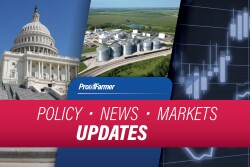Policy Updates
President Trump has implemented a temporary 10% global tariff on imports in response to the recent Supreme Court ruling, but several agricultural goods are off the tariff list.
In a landmark ruling released Friday, the U.S. Supreme Court determined that President Donald Trump overstepped his legal authority by imposing broad tariffs under national emergency laws.
The U.S. State Department has placed administrative “holds” on worker visas, stalling their arrival and work start dates, which have forced employers to incur substantial costs for housing, food, security, and other expenses while they wait.
Republicans on the House Agriculture Committee rolled out a draft that aims to address contentious policy areas left unresolved after last year’s legislation and update a range of agriculture, food aid and regulatory programs.
Following its historic January update, which revised corn acres much higher than initially projected in June, USDA is facing criticism from farmers, grain traders and economists.
Donald Trump signed a proclamation expanding the amount of beef the U.S. can import from Argentina by 80,000 metric tons.
House Republican leadership loses bid to block tariff challenges
ASA, NOPA cheer release, push for clarity on Renewable Fuel Standard
The U.S. Department of Agriculture stunned grain markets by reporting a record-high corn production of just over 17 billion bushels, driven by unexpectedly strong yield and harvested acreage figures.
In one of its last major actions of 2025, the U.S. Senate approved a large slate of nearly 100 administration nominees, including several key figures for agricultural trade and USDA leadership.


